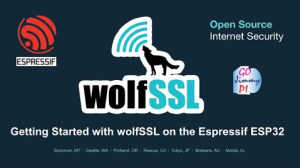We are pleased to announce the release of wolfBoot 2.5.0, the newest version of our universal secure bootloader. This release marks another milestone in the continued evolution of wolfBoot, reinforcing its relevance as a cutting-edge secure boot solution for embedded systems. WolfBoot 2.5.0 brings expanded hardware support, major new features, and a host of improvements to performance and security, all while maintaining the simplicity and robustness our users expect.
New hardware targets and platform enhancements
wolfBoot 2.5.0 expands its hardware compatibility, adding support for several new platforms and improving existing targets. Notable additions and enhancements include:
- New target support: wolfBoot now supports the Raspberry Pi RP2350 microcontroller, NXP’s MCX family (including the MCXA153 and MCXW716 series), and the STMicroelectronics STM32F1 series. These additions extend wolfBoot’s reach from the latest Pi Pico 2 board to NXP’s advanced Cortex-M33 based MCUs and even legacy STM32F1 devices (like the popular “blue-pill” board), demonstrating once again our team’s commitment to maximize device coverage.
- Enhanced support: Existing platform ports have been refined for better stability and performance, notably for the Xilinx UltraScale+ MPSoC (ZynqMP), Renesas RX family, and Infineon AURIX TriCore TC3xx microcontrollers. Developers using ZynqMP devices will benefit from smoother integration (e.g. improved standalone boot support and exception level handling), while updates to the Renesas RX and AURIX TC3xx ports include more efficient flash management and boot-time reliability improvements. These platform enhancements make it easier and more efficient to deploy wolfBoot on a wider range of hardware.
Major new features and enhancements
Version 2.5.0 introduces several important features aimed at both simplifying the developer experience and strengthening security:
- Non-contiguous ELF section support: wolfBoot can now load and verify firmware images with non-contiguous (scattered) ELF sections. In practical terms, this means the bootloader handles images that are split across multiple memory regions, accommodating complex memory maps and multi-part firmware layouts. This feature adds flexibility for projects that utilize segmented flash or RAM areas for their application code and data.
- Streamlined PQC integration: Post-Quantum Cryptography support in wolfBoot has been simplified and updated. WolfBoot 2.5.0 includes the latest PQC algorithm support from wolfCrypt (such as the recently standardized ML-DSA) and makes it easier to configure PQC-based signature verification. By refining the integration of PQC algorithms, we continue to help users prepare for a post-quantum future without sacrificing ease of use.
- Static library build option: In addition to the traditional standalone bootloader binary, wolfBoot can now be built as a static library (libwolfboot.a). This gives developers the flexibility to integrate wolfBoot’s secure boot functionality directly into their applications or custom boot frameworks. The static-lib build simplifies certain use cases — for example, linking wolfBoot into a monolithic firmware image or using wolfBoot features in an RTOS environment — by allowing wolfBoot to be called like a library rather than a separate bootloader image.
- Glitch attack mitigation (IAR toolchain): Security against hardware fault-injection attacks (glitches) has been further hardened in this release. We’ve extended our glitch mitigation techniques to better support the IAR Embedded Workbench toolchain, ensuring that builds compiled with IAR include additional countermeasures against timing and voltage glitch attacks. These low-level improvements make the secure boot process even more resilient to physical attack attempts, protecting the integrity of the firmware verification steps.
Build system and documentation improvements
wolfBoot 2.5.0 comes with numerous build system refinements and documentation updates to streamline development. We have refactored the CMake build system to improve cross-platform support and clarity, making it easier to compile wolfBoot for various targets and toolchains. This includes cleaner integration for IAR and other compilers, as well as a more organized project structure for out-of-the-box builds. Additionally, our documentation has been improved across the board – from updated user manuals and API references to new examples and guides – to help both new and experienced users get the most out of wolfBoot. Whether you’re configuring a multi-slot update scheme or integrating wolfBoot with a TPM, the clearer documentation will guide you through the process more smoothly. (As always, detailed change logs and usage instructions can be found in the README and docs accompanying the release.)
Bug fixes and updated modules
As with every release, wolfBoot 2.5.0 includes key bug fixes that enhance stability and reliability. Various minor issues identified in the previous version have been addressed, resulting in a more robust bootloader across all supported platforms. In particular, fixes were applied to edge cases in flash memory handling and update workflows to ensure consistent behavior in all update scenarios.
Moreover, the cryptographic and secure hardware modules underlying wolfBoot have been updated to their latest versions. wolfBoot 2.5.0 is powered by wolfSSL 5.8.0 – bringing in the newest optimizations and post-quantum enhancements from the wolfCrypt engine – and it can integrate with wolfTPM 3.9.0 for TPM-based secure boot use cases. By using the latest wolfSSL v5.8.0 and wolfTPM v3.9.0 releases, wolfBoot ensures compatibility with the most up-to-date security features and fixes from those libraries. This means developers get improved performance, up-to-date cryptographic algorithms, and continued FIPS 140-3 readiness through wolfCrypt.
wolfBoot’s security is, as always, built on wolfCrypt, which allows the boot process to leverage FIPS-certified crypto and even meet safety standards like DO-178C when required. Upgrading to wolfBoot 2.5.0 brings all these benefits into your secure boot process.
Getting wolfBoot 2.5.0 and support
wolfBoot 2.5.0 is available for download now, and we encourage everyone to try out the new features and improvements. You can find the source code and release package on our GitHub repository and the wolfSSL download page. Documentation for this release, including an updated user manual and examples, is available on our website to help you get started quickly.
If you have any questions about wolfBoot 2.5.0 or need help with integration, please contact us at facts@wolfSSL.com or call us at +1 425 245 8247. The wolfSSL team offers commercial support and consulting services for those who require dedicated assistance or custom features. Whether you are upgrading an existing project or designing a new device with wolfBoot, our team is here to ensure your secure boot implementation is successful.
Download wolfSSL Now



